Movie Reviews

If I had more money and time, I'd see more movies. Nevertheless, I've added a movie review index in the links on the top left.
Enjoy.
Quote for the Day #7: A Man's Best Friend
Correcting a Hymn's Theology: Exactly Who's Committed What to Whom?
But I know whom I have believed,
And am persuaded that He is able
To keep that which I've committed
Unto Him against that day.
I've always liked this hymn's words and it's melodic sway. It's one of those songs that gets in my head, but unlike some songs, I don't mind this one repeating itself over and over. In fact, it stayed with me all weekend long in more ways than one, which I will describe below.
But as I was translating the verse, it seemed to make more sense to translate it as "He is able to keep/guard that which has been committed/deposited TO ME." In other words, Paul is not committing something to God for safekeeping, but rather God is protecting something that he has given to Paul. And of course, exactly what it is that has been entrusted is open to debate, especially considering that the verse can be translated these two different ways. Any quick survey of translations will provide a variety of suggestions including the gospel, Paul's soul, his converts, the grace that God's given to him, his teachings and no doubt a few more.
I have about five commentaries on the Pastorals on my shelf, so I surveyed about three of them which I thought might address the issue. I. Howard Marshall disagreed with me, as did Luke Timothy Johnson. But Donald Guthrie came to the same conclusion I did:
The words translated that which I have committed unto him mean literally "my deposit" (paratheke). the same word paratheke, is used in v. 14 and 1 Tim 6:20, where in both cases it describes the deposit committed to Timothy for safekeeping. But the present verse focuses attention on God's ability to guard. The "deposit" could be understood either of what God entrusted to Paul or what Paul entrusted to God, but since in the other occurrences in the Pastorals the word paratheke is used in the former sense, it is most probably used in the same sense here. In that case the reference is to the work which the apostle was commissioned to do or the doctrine entrusted to him.
Donald Guthrie, The Pastoral Epistles, TNTC, vol. 14, p. 132.
The consensus of the class was that the hymn (which is based on the KJV) is, in fact, wrong. Paul is speaking of something entrusted to him by God. Later this weekend, I was able to scan a few English translations and find that there's no consensus, even among the more contemporary translations.
Among the translations which favor the more traditional idea (as in the song) that Paul has entrusted something to God for safekeeping, include the NASB, NIV, TNIV, NRSV, and NLT.
Those translations that agree with my conclusion--that God has given something to Paul which God will protect--include the HCSB, ESV, GWT, the Message, and NET.
An example: “But I am not ashamed, because I know whom I have believed and am persuaded that He is able to guard what has been entrusted to me until that day.” (2 Tim 1:12, HCSB)
Now, I'm really the kind of person who would rather avoid modernizing old hymns. I disagree with those who would change "Here I raise mine Ebenezer" to "Here I raise to thee an altar" in the wonderful hymn "Come Thou Fount of Every Blessing." I think it would be better to have a quick Bible lesson on 1 Sam 7:12 before or after the hymn is sung.
But what do you do if a hymn has been written based on a mistranslation of a Bible verse?
By coincidence, or divine sense of humor (?), guess what hymn we happened to sing this morning at church? I had already discussed some of this with Kathy, and when the words began to flash upon the screen we both looked at each other wide-eyed. Sure enough, it was "I Know Whom I Have Believed." What are the odds of that? Since I had the opportunity to sing it in worship, I wondered how hard it would be to correct the words. I found it quite easy to do, actually. Simply alter the words slightly so that you sing
But I know whom I have believed,
And am persuaded that He is able
To keep that which He's committed
Unto me against that day.
It works with very little violation to the original hymn. Since so many churches use projection screens instead of hymnals these days, it could be done without most people even noticing the change, let alone getting upset.
However, I doubt that's going to happen. Perhaps it's just best to leave an old hymn alone.
What do you think?
Tick & Train
I received a "Christianitytoday.com Connection" email this morning that highlighted two new commercials which they described as "designed to encourage people to protect the world God has given us." I am going to post the two videos here, but don't just view them (or ignore them) and move on. I'm also providing a link that gives the science behind these commercials.
Until recently, I ignored or even scoffed at this issue. However, like a lot of other evangelicals, I'm waking up to the facts. Care of creation is OUR responsibility, given to us in Genesis 1:27 ff. To neglect our responsibility in this matter is to be in rebellion against God and his good creation.
TICK:
TRAIN:
Find out more--Science Behind the Ads.
2nd Call for NT Survey Bibliography Suggestions
Back a few months ago, I actually sat down and read the adjunct faculty handbook for IWU and noted that we are encouraged to provide a bibliography of related and further reading in our syllabi. As I've taught new classes, I've been steadily updating old syllabi by adding bibliographies.
Next week, I'll be teaching a NT Survey course at the Louisville branch of IWU. I'm calling for suggestions for the bibliography. Keep in mind that these are not religion majors, but actually business students who are required to take the NT Survey class. I am looking for books that I can recommend for those who want to dig a bit deeper or read a bit further on the subject. Books about the NT, Bible in general, principles of interpretation are the kind of thing I'm looking for.
If you have any books you'd like to suggest, please leave them in the comments.
Prospectus Delivered!
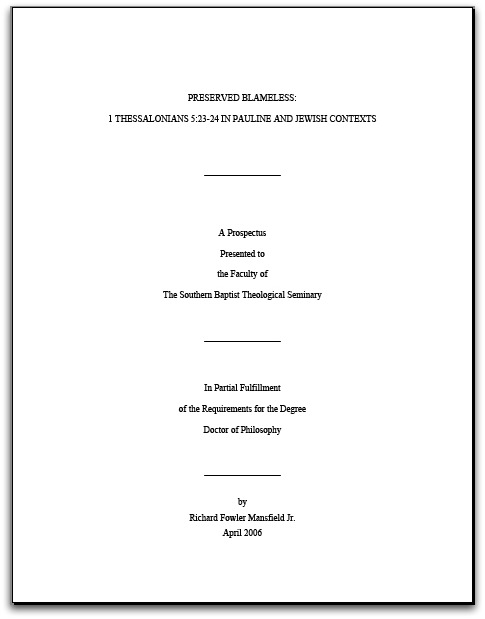
Please pardon the rare personal entry, but I just really feel good right now.
This afternoon I officially delivered my prospectus to the SBTS Doctoral Studies Office. I haven't announced it before now, but the title for my dissertation (unless it changes before May 3) is "Preserved Blameless: 1 Thessalonians 5:23-24 in Pauline and Jewish Contexts."
What happens now?
Well, next Wednesday, April 26, I will present the prospectus to the NT Colloquium for critique and suggestion. Normally, this is done before submitting the prospectus to the Doctoral Studies Office, but today was the semester deadline for submission, and I switched presentation dates with another student who preferred to present this week. That worked out for me, too, because I don't think I would have been quite ready to distribute copies to colloquium a week ago (they have to be distributed a week in advance).
Then on May 3, the title of my prospectus will go before the entire SBTS faculty for a vote. They don't actually see the entire prospectus, although my supervisor would be present, presumably to answer any content questions that might come up.
Finally, if approved by the faculty, I'll begin writing in May.
But for now, today's a great day!
Why I Still Use a Zip Drive with My Mac

A few months back, I made a mistake. I walked into a Best Buy (should I just stop there?) and asked a clerk if they had any Zip disks. "No, we don't carry those anymore," he said. "They're old technology. What you need is a thumb drive."
Don't presumptious people aggravate you? What I need? What I need? "How would you possibly know what my needs are?" I asked.
He just kinda looked at me with a blank stare. "Umm... I guess I don't." Right.
What exactly replaced the floppy disk? The writable CD? The writable DVD? The USB flash drive? Network storage?
Well, it should have been the Zip disk. But Iomega messed things up. How? I'll tell you.
I remember a time in the early nineties when I had all my personal data backed up on 300 floppies. Second hard drives were too expensive for the average user as were CD burners which at the time cost about $1500. I still remember the local computer shop that would burn a CD with your data for you for $75! I actually took them up on this, believe it or not. One CD meant that I could chunk the 300 floppies and not have to remember which disk contained what. I think I shocked them when I brought in my shoeboxes of disks. They had advertized that they would load your disks for you. My 300 disks led to a new policy in which they would no longer do this, but send a tape drive home with you to grab your data. I don't know... $75 for a CD is mind boggling today. For that price I don't think that copying the files from my 300 disks was too much to ask.
Around that time I saw my first Iomega Zip drive. As described above, no regular computer user had his own CD burner at the time. But with the Zip drive, you cold fit 100 MB on one disk! That was the equivalent of almost 70 floppies. A few years later, Iomega would release a 250 megabyte model and today they sell a Zip drive that will write 750 MB onto a single disk which is slightly more than a standard CD.
So how come I'm the only one using them? I mean, really, I don't personally know anyone who uses a Zip drive anymore although Iomega still sells all three models.
In reality, the Zip drive should have replaced the floppy drive.
They are better than a CD because you can constantly write to them. Granted, you can use CDRW disks or create multiple burn sessions on a regular CD, but all of this is too much trouble. With a Zip disk, I can just continually throw files at it the same as I would any hard drive on my machine. In other words, I can write to it dynamically.
They're better than thumb drives in my opinion. Okay, actually, I think they are used differently. Thumb drives will do the same thing I describe in the paragraph above. However, the nice thing about a Zip disk is that I can write a category on a label and use different Zip disks for different purposes. I can't imagine having half a dozen flash drives, each for a different purpose (although I am sure there are some who do).
I keep a Zip 250 USB drive on my desk at school. Having seen too many hard drives die, I'm paranoid about losing the information I'm working on. As I've been writing the prospectus for my dissertation, I make backups to a Zip disk a couple of times a day. I back up the relevant documents and my bibliographical database. This will become even more important once I begin the actual dissertation.

At home I have a Zip 750 attached to the eMac. It's great for storing the original installation files for software that I've bought online. The other day I bought and downloaded Photoshop Elements 4. The installation download was a huge 450 MB. I pulled out the Zip disk that had Elements 3.0 on it, deleted that old version and copied the new one to it--in case I ever need to reinstall. Why not just copy this to a CD? Well, I can store lots of programs on there, add them whenever I want, and delete the old versions. I downloaded Quicken 2006 a few weeks back, too. I keep that installation file on the same Zip disk. In fact, I have two disks simply labeled "Programs." If I get a new version of a program, I can simply delete the old version off the disk. No need to burn a whole new CD. I have another disk that contains a kabillion Adobe fonts that I've collected over the years--especially from the time when I used to do graphic design. I don't want to get rid of these fonts, and occasionally I need to install one of them, but there's no need to keep them on my hard drive, so the Zip disk works nicely.
But I'm assuming that you don't use a Zip drive. And this is Iomega's fault. I see two reasons for the fact that Zip drives peaked a few years ago, but have declined ever since.
The first is that the media is too expensive. A 750 MB disk will cost you $15. And a 250 MB disk costs $12. Get this--a single 100 MB disk costs $9! Can you imagine? When the average 700 MB CDROM costs about 10¢, this makes no sense to the average consumer, regardless of the advantages I describe above. For that difference in price, the average user will simply burn that 39k Word file to a CD and throw it away after it's been transported.
Second, Iomega should have never made the user have to upgrade the drive just to read newer media. When I bought my first digital camera, the largest compact flash card was 256MB. The same card reader that read those CF cards will read the newer ones that are a gigabyte in size. Why Iomega didn't design the Zip drives to do the same thing as larger capacity disks were released is beyond me. Well, actually it's not. I suppose it was about money. But I think that's come back to bite them.
It's too bad. If Iomega had addressed the two issues above, I have no doubt that Macs and PC's would have come with a DVD/CDROM drive in one bay and a Zip drive in the second bay. And the Zip could have replaced the now defunct floppy drive a decade ago. It's not meant to be, though.
At least they work for me.
Reflections on "God or the Girl"
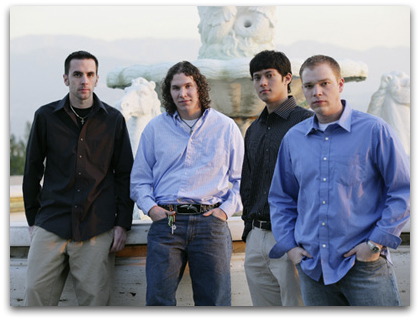
Above: Mike, Dan, Steve & Joe seek to decide between celibacy in the Catholic priesthood or married life as laymen.
Tonight, I caught the third episode of of the A & E miniseries/documentary, "God or the Girl." The series follows four single young men for a number of weeks as they wrestle with whether God is calling them to the priesthood or to a life of marriage. I'll admit that upon hearing about "God or the Girl," I was a bit biased. I assumed that the subject would be approached from a highly sensationalistic viewpoint. Would the young men commit themselves to God, only to have the producers parade a number of scantily-clad young women before them? What's it going to be--GOD? Or the GIRL?
Perhaps the show would have been like that if it had been produced for Fox TV. Fortunately, this is an A&E show, and I found they treated the subject matter and the faith of these young men with the utmost respect. I felt for these young men. They all take their faith very seriously. They want to be true to the call of God on their lives. Joe stated a number of times, "I just want to be 100% sure." Well... good luck with that.
Look, I know what it's like to struggle with God's call upon my life. Such things should be taken very seriously. I never really felt called to celibacy though. Okay, I'll be honest... I don't think I ever even PRAYED about that one. But you've got to admire the folks, regardless of denominational affiliation, who take a vow of singleness/celibacy.
The Apostle Paul seems to exalt singleness above married life:
“I would like you to be free from concern. An unmarried man is concerned about the Lord’s affairs—how he can please the Lord. But a married man is concerned about the affairs of this world—how he can please his wife— and his interests are divided. An unmarried woman or virgin is concerned about the Lord’s affairs: Her aim is to be devoted to the Lord in both body and spirit. But a married woman is concerned about the affairs of this world—how she can please her husband. I am saying this for your own good, not to restrict you, but that you may live in a right way in undivided devotion to the Lord.
If anyone is worried that he might not be acting honorably toward the virgin he is engaged to, and if she is getting beyond the usual age for marrying and he feels he ought to marry, he should do as he wants. He is not sinning. They should get married. But the man who has settled the matter in his own mind, who is under no compulsion but has control over his own will, and who has made up his mind not to marry the virgin—this man also does the right thing. So then, he who marries the virgin does right, but he who does not marry her does better."
(1 Cor 7:32-38, TNIV)
I feel for the young men's struggle as it's depicted in "God or the Girl." I regret that for them and their denomination (the Roman Catholic Church) that it's an either/or proposition to begin with. Although my own denomination probably incorrectly downplays a call to single life, we don't make our seminary students choose between ministerial service and family life. In fact, married life is generally encouraged for the sake of propriety.
I know I run the risk of offending my Catholic friends, but I honestly believe that the continued requirement of the Catholic Church for their priests not to marry is a mistake. Although there are some very good, capable and qualified priests in the Catholic Church, I believe that by continuing this nonbiblical requirement, they unnecessarily exclude a large number of extremely gifted and otherwise qualified men who could be priests. And, although I don't want to pursue the subject further at this point, I believe that some of the recent problems with pedophile priests stem from this mistake. Further, the Catholic Church is having more and more difficulty finding young men willing to "forsake the world" in surrender to the priesthood. Allow these priests to have families and the shortage of quality candidates will disappear.
The truth is that there was no requirement forbidding priests to marry in the early church. It was not even an issue until maybe the 4th century with Augustine, who greatly struggled with sexual desire before his conversion and Jerome who took a low view of both sexuality and women in general. But such ideas are neither biblical nor Christian, although they've been mistakenly taught at times in the history of the church. And priests were not strictly forbidden to marry for at least the first 1,000 years of church history, if not longer.
Again, I feel for Mike, Steve, Dan, and Joe. Their sincere desire to please God is admirable. However, I hope that eventually the leaders of their denomination will have the wisdom to rethink their traditions, especially in light of biblical teaching on the subject.
Hyperion
When I had a few moments to sit on my back patio yesterday, I finally got around to perusing the April issue of National Geographic that had come in the mail a few weeks ago. On p. 26 or thereabouts (it's not actually marked), there is a stunning picture of Hyperion, the absolute oddest of Saturn's 47 or so moons.
[Side note: Hyperion was the name of an unremarkable Titan in Greek mythology. His name is included in the lists of the Titans, but nothing else is known of him.]
Now before you see the clarity of the image, consider that before 2005, most of the images we had of Hyperion looked like something like this:

But last Fall, Nasa's Cassini's spacecraft was able to capture this incredible image:

From the April 2006 National Geographic:
Saturn's Strangest Moon. The Cassini spacecraft swooped in just 310 miles above the surface to get this closest ever view of Saturn's moon Hyperion. About 178 miles in diameter, the irregularly shaped satellite circles Saturn in a tumbling rotation. It's been theorized that Hyperion's odd shape was caused long ago by collisions with other objects in space. Hyperion's cratered surface, however, is a revelation; none of Saturn's other 46 moons look similar. Scientists are now studying the new images to help clear up questions about Hyperion's origins.--Margaret G. Zackowitz
Incredible. Simply Incredible.
“When I consider your heavens,
the work of your fingers,
the moon and the stars,
which you have set in place,
what are mere mortals that you are mindful of them,
human beings that you care for them?
You have made them a little lower than the heavenly beings
and crowned them with glory and honor.”
(Psalm 8:3-5, TNIV)
Easter & the Renewal of Spring

These trees have only started to turn green. Soon they will be so full of leaves, the branches won't even be seen at all. I also saw bats after it began to turn dark. We have lots of bats out here where I live. I often like to sit on the back swing on a summer night and watch their sonic-induced erratic flight.
With it being Easter Sunday, my thoughts moved to Jesus' resurrection. Obviously, there was great theological significance for Jesus' crucifixion and resurrection to take place during Passover, since Jesus was the lamb of God, come to take away the sin of world (John 1:29). However, as I looked at the trees beginning to bloom, I thought to myself that even the trees were giving witness to the resurrection. Is it not also fitting that the resurrection of Christ took place during the springtime of the year?
“Let the fields and everything in them exult.
Then all the trees of the forest will shout for joy
before the Lord, for He is coming—
for He is coming to judge the earth.”
(Psa 96:12-13 HCSB, emphasis added)
Even the pagans recognize the promise of new life that comes with the spring. But they miss the point. Eternal life comes through Christ. We will live because he lives. As with the new life of spring, we have the promise of renewed life through Him.
“But now Christ has been raised from the dead, the firstfruits of those who have fallen asleep. For since death came through a man, the resurrection of the dead also comes through a man. For just as in Adam all die, so also in Christ all will be made alive.”
(1Cor 15:20-22, HCSB)
Happy Easter.
Happy Spring.
Happy New Life.
Happy Eternal Life.
An Easter Sonnet
Before the tomb, their minds consumed with stone
Inertia their absorption, they bemoaned
His death, and pondered dully what to do.
Could messianic claims be so askew?
Could words of promise shrink to froth and foam?
Was God's own remnant once more left alone?
Could hatred swallow love so wholly true?
No stone to bar them, nor a corpse to see
No special seal, no purpose in perfume,
No stalwart soldiers in full panoply--
But angel presence and an empty tomb
"He is not here; he's risen, as he said.
Come see the place where once cold lay the dead."
"Sonnet 26"
D. A. Carson, Holy Sonnets of the Twentieth Century
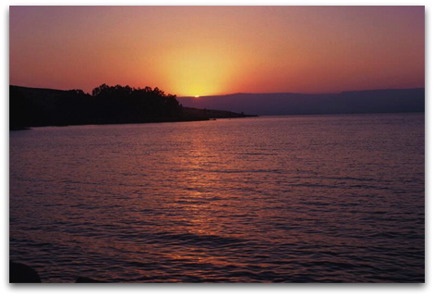
Sunrise over the Sea of Galilee from the Accordance Bible Lands Photo Guide
Happy Easter!
“He is not here, for He has risen, just as He said.”
(Matt 28:6, NASB)
A Very Important Message from President George Bush on Global Warming
Kathy's Colloquy
Left neglected for quite some time, Kathy has decided to refocus her blog toward other things. She writes in a new posting, "Although many of my postings will probably deal with book, library, and education themes, some will inevitably be personal in nature."
Kathy has also renamed her blog. It used to be simply "Simpsonville Elementary Library Blog," but now it has been renamed "Kathy's Colloquy." If you don't like that name, blame me. She was content with a simple title, "Kathy's Blog," but I suggested we find some kind of alliteration.
What's a colloquy? Glad you asked.
The Merriam-Webster Dictionary gives this explanation for "colloquy":
Etymology: Latin colloquium, from colloqui to converse, from com- + loqui to speak
Date: 15th century
1 : conversation, dialogue
2 : a high-level serious discussion : conference
The Oxford American Dictionary adds "a gathering for theological discussions."
All of these definitions are fitting. And Kathy has turned on the comments so that true discussion can take place.
I even suggested she call her blog "Kathy's Kolloquy" for visual alliteration, but she said that everyone would think she doesn't know how to spell "colloquy."
Feel free to stop by Kathy's Colloquy. Encourage her to post because I promise you that her thoughts can be quite engaging. In fact, one might argue that she's more opinionated that I am (I mean that as a compliment, Dear).
About $1,400

$1,400--that's the monthly pension that Mikhail Gorbachev, former leader of the Soviet Union receives per month from his government. Technically, it's 40,000 rubles, but $1,400 to you and me. And to think of that as a yearly retirement, that's $16,800 a year!
This information comes from the April 9, 2006 issue of Time Magazine, in a mini-interview, "10 Questions for Mikhail Gorbachev."
The most interesting question in the interview is Gorbachev's take on the economic difficulties faced by those living in the Russian states today. In answer to the question, "What is the root of the current difficulties in the lives of many Russians?" Gorbachev places the blame squarely on the shoulders of his successor, Boris Yeltsin:
Yeltsin ruined the country. He allowed the wealthy of the country to be taken by a few people. And the West was never critical of Yeltsin. I think President Vladmir Putin is correcting the mess that Yeltsin made.
Fascinating stuff. But I still can't get past his pension of $16,800 a year.
I couldn't remember, so I looked up the pension amount we give our former presidents. We haven't always provided for our former leaders, but the practice began in 1958 when Congress passed the "Former Presidents' Act" on behalf of former President Harry S. Truman who was in such bad financial shape that he and Bess Truman had to move into his mother-in-law's house after his term as president ended.
Currently we pay our former presidents $157,000 a year. Not too shabby compared to their Russian counterpart. If you're keeping track, this amounts to a little over $13,000 a month, somewhat shy of Gorbachev's entire yearly salary.
But it doesn't stop there. We also provide our ex-presidents lifetime healthcare and even free postage. Oh, and each former president presents a budget to the federal government each year to cover office equipment, travel and other expenses.
Now, I'm not saying that we shouldn't do that. We certainly wouldn't want any of our ex-presidents to live in poverty. However, consider that our former presidents do have other forms of income. At one point former president George Bush was making $4 million dollars a year in speaking fees. If you want Bill Clinton to address an audience, get ready to pay $100,000 or more. And of course, don't forget the multi-million dollar book deals. I don't begrudge anyone making money, but this is a far cry from Herbert Hoover, who refused his president's salary after making a fortune as a mining engineer. See "Too Rich a Deal for Ex-Presidents" for more information.
According to the Time interview, though, Mikhail Gorbachev has taken a cue from his American counterparts. The 75-year-old Gorbachev's newest book is entitled To Understand Perestroika. I hope it will sell well for him.
One final note. It's hard for me to think about Gorbachev and not remember the book given to me at the 1988 Christian Booksellers Association, Gorbachev: Has the Real Antichrist Come by Robert Faid.

I guess Faid was wrong, wasn't he? I didn't doubt that then of course either. But I've always held onto this book as an example to show to my classes as to why to avoid the latest sensationalistic attempt at identifying predictive prophecy with exact figures of current events.
Fire and Ice
Irenaeus and the Gospel of Judas
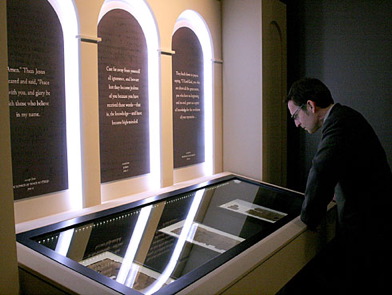
Is the Gospel of Judas that is receiving so much attention this week the same Gospel of Judas mentioned by Irenaeus, a second-century bishop and apologist for the faith? Some want to claim that it is thereby cementing a date of writing for the Gospel of Judas at least as early as 170-180 AD--as if an earlier date would add to its credibility. Having looked at Irenaeus' words on the the subject, I'm not convinced they're one and the same.
In Against Heresies, ch. 31 Irenaeus devotes his attention to a gnostic group that he calls "the Cainites." Below is his description of the groups' teachings as recorded in the particular extra-biblical Gospel of Judas with which he is familiar.
Others again declare that Cain derived his being from the Power above, and acknowledge that Esau, Korah, the Sodomites, and all such persons, are related to themselves. On this account, they add, they have been assailed by the Creator, yet no one of them has suffered injury. For Sophia was in the habit of carrying off that which belonged to her from them to herself. They declare that Judas the traitor was thoroughly acquainted with these things, and that he alone, knowing the truth as no others did, accomplished the mystery of the betrayal; by him all things, both earthly and heavenly, were thus thrown into confusion. They produce a fictitious history of this kind, which they style the Gospel of Judas. (Irenaeus, Against Heresies 31:1)
Now, if you downloaded the National Geographic Society's translation of the Gospel of Judas and actually read any of it, you may have noticed that much of what Irenaeus describes above is not found in the document we currently have. There is no mention of Esau, Korah, or the Sodomites. Most significantly, there is no mention of Cain which is supposed to be a core figure in the history Irenaeus says is described in the Gospel of Judas with which he is familiar. Yes, Sophia (as the personification of wisdom) is mentioned, but that is fairly common for many of these gnostic writings.
Now to be fair, you may have noticed that the Gospel of Judas manuscript we have is incomplete. Perhaps, some of these missing features are found in the parts of the text that are missing. Maybe...but maybe not. I'm not an expert in these things by any means, but I've read my share of Gnostic writings, and the Gospel of Judas that we currently have certainly feels like the Nag Hammadi texts of a century later such as the infamous Gospel of Thomas.
But let's play devil's advocate for a minute. What if it was earlier? What if it is the same as Irenaeus's Gospel of Judas and thus it is decidedly given a second century date. Does this matter? Should we join in with the sensationalistic view that perhaps the Gospel of Judas is a contender as a fifth gospel?
In a word...no.
There are New Testament references to other writings that aren't in our New Testament. There's at least one other letter written by Paul to the Corinthians that we don't have. There is a letter he wrote to the Laodiceans. But even if we found these letters, they wouldn't warrant inclusion into the New Testament because they were rejected by the early church as being neither authoritative nor inspired. That's probably also why we don't have these letters anymore. And the Gospel of Judas was probably considered insignificant in its time or immediately afterwards, which is why we have only one extant copy to this day and why it took 1700 years to find it. And there are dozens of other writings by Christians, even much earlier than the Gospel of Judas that did not make it into the New Testament. Consider the Shepherd of Hermas, the Didache, the Epistle of Barnabas. Although these are edifying reading, they are not considered inspired or authoritative.
The reason that the Gospel of Judas does not warrant inclusion into the New Testament is because the New Testament canon is closed. This is a matter of theology and history. Even if it were determined that the Gospel of Judas was written in the first century, it still would not qualify for inclusion into the NT. The early church had certain litmus tests for what was chosen to stand alongside the Hebrew Scriptures as sacred canon. This included whether or not a document was written by an apostle or at least by someone who had direct access to apostolic witness. Also there was the issue of whether or not the early church viewed a writing as authoritative and bearing the marks of being inspired by the Holy Spirit.
As I directed in the previous post, I still recommend F. F. Bruce's The Canon of Scripture as highly recommended reading on the subject of why our New Testament takes its final form.
I'll admit that the discovery and translation gospel of Judas is interesting. I've probably downplayed that fact in reaction to all the unnecessary hype that the document is receiving.
And I agree that it should be studied further. But I believe it should be studied for what it is--a representative of 3rd/4th century Gnostic writings, not a contender for a fifth gospel in the New Testament.
My Argument Against the Gospel of Judas: Let Me Clarify for My Critics in Taipei

Above: A section of the document in question with the name "Judas" in Coptic letters.
I noticed this morning that my website was receiving a number of hits from Taipei, the capital in Taiwan. I followed the referring link to discover my article below discounting the Gospel of Judas was being discussed in a Taiwanese forum. See for yourself at http://ubb.frostyplace.com.tw/viewtopic.php?p=122664
Since I don't read Chinese, I couldn't follow any of it except for a post written in English by an individual named "fuigo." Here is what he said:
I don't know. This person seems a bit extreme.
I haven't checked out the National Geographic website, but on NY Times, it is mentioned that the so-called Gospal of Judas is a work done later in a different language in line with the culture and tradtition during that era. This person's sweeping claim that this Gospel of Judas is not a contender for a place in Scripture is not convincing. The fact that this document is not made old enough doesn't automatically mean there isn't one made earlier. I honestly do not understand the author's logic.
The author goes on and explains Gnosticism. He defined it as a cult; similarly, NY Times mentions Gnosticism as a group people who could escape the prisons of their material bodies and return to the spiritual realm from which they came[sic]. As NY Time points out, Gnostics' beliefs are often considered by early church leaders as unorthodox or even denounced as heretics. I also do not see how this could immediately eliminate the validity of this piece of work.
Anyway, I am babbling. I would like to see more research done on this before I make any judgements.
I tried my best to create an account and reply directly in this forum, but despite my best guesses in dealing with the new account form, I never had any luck getting logged in. Too bad I don't read Chinese.
However, I was able to email fuigo. Here is what I wrote:
Maybe I wasn't clear in my argument. But the gospels as contained in the New Testament were eyewitness accounts of the life of Christ. This document is definitely later. We know this not just by the carbon dating--you are right, it could just be a later copy of an earlier work. But rather, the theological content is gnostic in nature and comes from at least a century later, if not probably more, than any of the eyewitness accounts in the New Testament. No one, and I mean no one--not even those who are excited about the Gospel of Judas--truly believe that there's anyway it could date from the first century.
Gnosticism as described in the Gospel of Judas and in the Nag Hammadi codices simply didn't exist anywhere in the first century. It's not an eyewitness account, so it's not historical. It's the writings of a very small group of believers who broke away from orthodoxy. The fact that we have only one copy of the Gospel of Judas compared with tens of thousands of copies of accepted New Testament manuscripts demonstrate that the church did not value this writing as genuine. ALL New Testament writings were written in the first generation of Christianity by eyewitnesses to the events described. The Gospel of Judas, while interesting in the study of this gnostic sect, is of no value to New Testament studies.
I don't have time to do it right now, but perhaps this summer, there would be a need to blog about the process of selection and canonization of the New Testament manuscripts. In the meantime, I wholeheartedly recommend the book, The Canon of Scripture by F. F. Bruce. This is one of the best sources I know to go to regarding the origins of our New Testament.
Oh, and fuigo, thanks for labeling me "extreme" simply because I disagree with all the non-scholarly, sensationalistic hype surrounding an insignificant gnostic manuscript.
The Gospel of Judas: What They Don't Want You to Know

This Sunday, April 9, the National Geographic channel will air a documentary detailing the discovery and translation of the so-called "Gospel of Judas." Tonight, I watched a preview of sorts in a segment on ABC's Primetime Live. If you go to the link I just provided and play the online video segment, you will hear an ABC correspondent say that "The Bible as we know it will be changed forever."
Really?
Really?
Well, don't count on it. During the Primetime segment, the question was asked as to whether or not Judas was actually the betrayer of Jesus as the Gospels in the New Testament portray him to be. According to the report, in this ancient document, Jesus himself asks Judas to betray him--to free his soul from the confines of his earthly body. Now, I've read the the translation of the Gospel of Judas that the National Geographic Society is providing. I can't actually find any place where Jesus asks Judas to betray him. Granted, there's lots of talk where Jesus says Judas will be misunderstood and persecuted, but later exalted for what he does (definitely a different take than the canonical gospels), but I don't read where Jesus actually asks Judas to do the deed.
Here's the closest you get to it:
Judas said to Jesus, “Look, what will those who have been baptized in your name do?”
Jesus said, “Truly I say [to you], this baptism [56] […] my name [—about nine linesmissing—] to me. Truly [I] say to you, Judas, [those who] offer sacrifices to Saklas […]God [—three lines missing—] everything that is evil.
“But you will exceed all of them. For you will sacrifice the man that clothes me.
Already your horn has been raised,
your wrath has been kindled,
your star has shown brightly,
and your heart has […]. [57]
“Truly […] your last […] become [—about two and a half lines missing—], grieve[—about two lines missing—] the ruler, since he will be destroyed. And then the imageof the great generation of Adam will be exalted, for prior to heaven, earth, and the angels,that generation, which is from the eternal realms, exists. Look, you have been toldeverything. Lift up your eyes and look at the cloud and the light within it and the starssurrounding it. The star that leads the way is your star.”
Judas lifted up his eyes and saw the luminous cloud, and he entered it. Those standingon the ground heard a voice coming from the cloud, saying, [58] […] great generation[…] … image […] [—about five lines missing—].
Now, in spite of the fact that ABC and the National Geographic Society (it makes me ashamed to admit I'm a member) are grossly exaggerating the content of the text, there is one extremely important fact about the document that is being downplayed in all the uproar. And it's something you need to know. In fact, I would dare say that it's the most significant fact about the so-called Gospel of Judas.
What is it?
Well, what you need to know is the date that this gospel was written. The Primetime Live segment never mentioned a date. And you really have to look hard to find this information on the National Geographic site. In fact, they tend to date it in reverse by saying that it is a 1700 year-old document. Here's what's really important, folks: The Gospel of Judas was written in the 3rd Century AD.
When were the gospels that are found in the New Testament written? They were written in the first century. To be exact, I personally believe they were written sometime between the mid-50's to the mid-60's. But hardly any scholar these days would date them past the mid-seventies (although there are a few holdouts who would date John to the 90's). Regardless, everyone gives them a first century date.
So what does that mean? Well, it means that the Gospel of Judas was not a contender for a place in Scripture. It was not excluded from the New Testament by any secret conspiratorial committee in the early church who didn't approve of its content or message. It was written two-hundred years or more after the New Testament.
The Gospel of Judas has more in common with the Nag Hammadi writings discovered in 1945 than with anything in the New Testament. What were the Nag Hammadi writings? They were a group of codices written in Coptic around the third or fourth century AD and contained what is known as gnostic Christian writings. Gnostic writings were a combination of Christianity, Greek Platonic thought, and mystery religions. Salvation was found through secret knowledge, and the ultimate goal was to be relieved of the body (which was seen as evil) so that the soul could take its rightful place in heaven. The Gnostics were essentially a Christian cult and from a contemporary perspective, you could group them with modern cults such as the Moonies or the Branch Davidians.
Is the Gospel of Judas a significant find? Well, in spite of all the hype, no, it's not! It's only of interest to those who study ancient history, specifically the weird and far-out teachings of the Gnostics. But Gnostic writings of the third and fourth centuries have NO bearing on New Testament studies.
Look, people need to get it into their heads that there's no smoking gun from the days of the early church. There was no conspiracy to hide the truth from some fifth or sixth of seventh gospel. There was no plot to hide a secret marriage of Jesus to Mary Magdalene and other Da Vinci Code conspiracy nonsense.
Besides the fact that the Gospel of Judas comes too late to even be considered for inclusion into the New Testament Canon, simply reading it reveals that it's of a completely different nature, character and flavor than the rest of the biblical writings. And that's true for most of the apocrypha and pseudipigrapha and other stuff that didn't make the "cut" for the Canon.
But if you want to get it all out of your system, I encourage you to read this ancient esoteric nonsense for yourself. I'm including below the National Geographic's translation of the Gospel of Judas. You read this, and then tell me if you honestly want this appended to the 27 books in the New Testament you are now carrying.
Download The Gospel of Judas:
GospelofJudas
Even with Dual Boot, We Still Need VirtualPC
But what about VirtualPC? Is it now a dinosaur? Irrelevant? A product of the old pre-Intel PowerPC days? I don't think so, and I'll make my case as to why. And before you say it, no it's not because I don't have an Intel-based Mac yet.
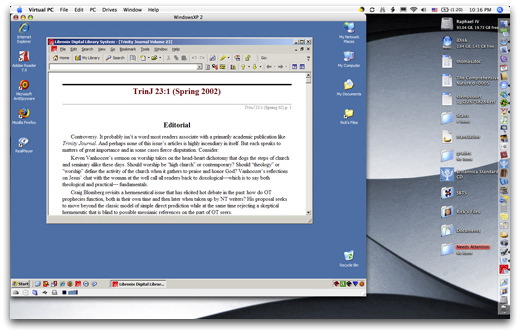
Above is a screenshot from my PowerBook with VirtualPC running in the foreground. VirtualPC allows me to run an occasional Windows-only program when I need to. Of course, it's always been slow, and even slower after the move to OS X. It's slow because on all PowerPC Macs, an Intel processor had to be emulated. Emulation makes everything slow. With Apple moving the Mac to Intel processors, there is great hope that VirtualPC will be updated so that a virtual Windows session will run at comparable speeds to a actual Windows PC. If there's no emulation bottleneck, VirtualPC should run quite respectably as long as the user has enough RAM.
However, some are seeing the new dual boot feature of Boot Camp as a sign that VirtualPC is no longer needed. Why do you need to run a virtual session of Windows if you can make your computer boot right into Windows?
Well, I'll tell you why.
VirtualPC is actually a fairly sophisticated program. I can drag files back and forth between the Mac finder and my virtual Windows desktop. I can copy and paste text and graphics between the two environments. I can save files directly from a Windows program to my Mac user account's documents folder. I can print from a Windows application and it goes into the same print que as my Mac applications. I can minimize or hide the Windows environment leaving it in standby mode until I need it. And the newest version of VirtualPC allows me to quit the program while saving the Windows session where it is, so that I don't have to boot it up from scratch next time I want to use it. It's really quite a mature program if you think about it.
But I wouldn't be able to have any of the functionality I've described in the paragraph above in a dual boot environment. If I needed to use a program in Windows, I would have to shut down Mac OS X and restart the computer in Windows. Once I complete that task, I have to shut down Windows and restart OS X. Is this progress?
Consider that back in 1990, before I had switched to the Mac, before I was even using Windows, I was a DOS user on a CompuAdd PC. I had two main programs that I used. One was WordPerfect 5.1 for DOS. The other was BibleMaster, a simple Bible software program that gave me access to the New American Standard Bible, which at that time was my translation of choice. Whenever I was working in WordPerfect and needed to access a passage from my Bible software, I had to save the file I was working in, close WordPerfect, and then run BibleMaster. If there was a particular passage I wanted to use, I had to save that passage as a text file, shut down BibleMaster, and then launch WordPerfect again where I would then import the text file. I would often go back and forth between the two programs quite a few times in one session. But each time, I had to shut one program down and then launch the other.
Without VirtualPC, we're a step back even from the old days of running one program at a time in DOS. Because in a dual boot environment, not only can I not use programs from Windows and Mac OS X at the same time, I also have to completely RESTART my computer just to go from one to the other. This is not progress.
A few weeks back, Microsoft committed publicly to updating VirtualPC for Intel Macs. I hope that today's announcement won't affect those plans. Boot Camp is significant for that switcher who's been living in the Windows world for his or her entire experience with computers. And it also will allow the PC gamer to buy a Mac or the Mac user to play a PC game. But for those who are doing significant work, who need to quickly go back and forth between a Windows and Mac environment, VirtualPC remains a necessary program.
Macs "Officially" Boot Windows, Too
In spite of the fact that I've been running Windows in VirtualPC ever since I switched to the Mac in 1998, everyone knows that it runs slow.

Pictured below is the startup disk selection in Mac OS X:
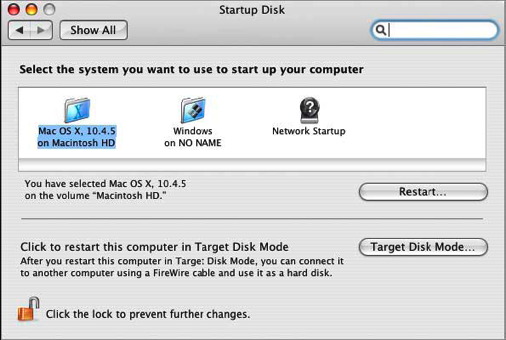
Pictured below is the startup disk option in Windows.
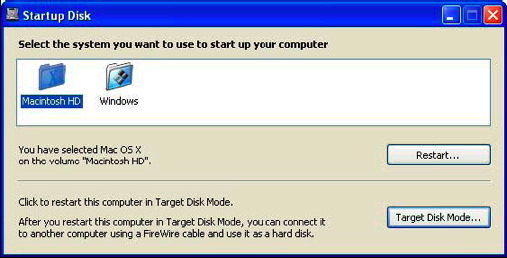
As of today, this dual-boot feature is only available on the MacBook Pro, iMacs, and Mac Minis. But as the entire line of Macintosh computers is moved over to the Intel processor, future Macs will have this capability, too. Keep in mind that Boot Camp is beta software. The final release will be included in Mac OS X 10.5 (code named "Leopard") later this year.
So, really now you can't even complain that Macs can't play your favorite game (you know who you are), can you?
Get a Mac.
Related Reading:
Apple's Boot Camp page
Apple: Windows on a Mac Is Here (c|net)
Apple's Boot Camp a "Game Changer" (MacNN)
The Greek Word for "Cool"
The Greek word I'm referring to is κλέος (kleos). If you read a modern translation of the works of Homer or other ancient Greek writers, it is generally translated "fame," "honor," or even "glory." The Louw & Nida Lexicon defines κλέος as "a good reputation as an index of status—‘honor, fame, good reputation.’"
Professor Timothy Shutt, who teaches Western Civ at Kenyon College in Gambier, Ohio, says that κλέος as the Greeks understood it was more akin to our modern idea of "cool." In his Foundations of Western Thought audio lectures, Shutt notes that the ancient Greeks were obsessed with κλέος--with one-upping each other, with being cool--and they contributed that obsession all the way down to our culture today.
The New Testament only uses κλέος once--in 1 Peter 2:20. Generally, translators render it as "credit" such as seen here in the Holman Christian Standard Bible:
“For what credit is there if you endure when you sin and are beaten? But when you do good and suffer, if you endure, it brings favor with God.”
(1Pet 2:20 HCSB)
It's hard to say exactly how Peter meant κλέος to be used here because that is the word's only occurrence in the entire New Testament (although it is used a couple of times in the LXX--Job 28:22; 30:8). But how would Greek readers have understood Peter's words? Consider 1 Pet 2:20 instead as I've paraphrased it:
"Is it cool for you to survive when you sin and are beaten for it? But when you do good and suffer--if you survive--that's cool, and brings favor with God."
Basic Principles of Communicating Negative Information
For instance, negative information (bad news) is best communicated through personal means. Face-to-face is ideal, but since that is not always possible, sometimes a telephone call is appropriate.
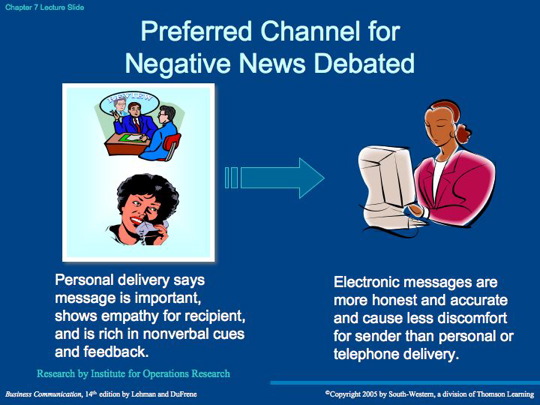
Email as a method of delivering negative information usually benefits only the sender and does not communicate empathy for the receiver. On the other hand, good news can be communicated through any means.
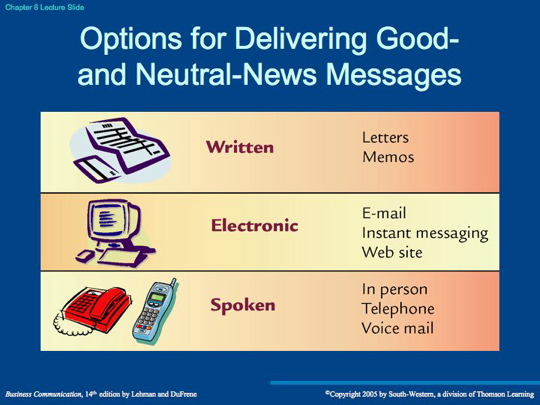
If this makes for good business practice in the workplace, why would we EVER want to communicate negative information via email (or other impersonal forms) in the church?
Sword in the Fire
Theron and I met back in the nineties when he was a student at SBTS. After receiving his M.Div, Theron made a surprising move (to some of us who knew him anyway) and converted to the Greek Orthodox Church. Although he's never said it in exactly this way, I believe Theron wanted a bit more traditio to add to the Reformation diet of Sola Scriptura that he had received. Because he's gone from Evangelical/Baptist circles to an Orthodox point of view, Theron often has some unique insights into issues involving the Bible, the church, and Christian life.
I've enjoyed catching up with Theron in person over coffee these last few months. We have great discussions about the Bible (including textual basis for the Bible!), the value of the Church Fathers for today (of which Theron is very knowledgeable, especially the Eastern fathers), theology, and the role and nature of the church in the modern world. Although we wouldn't agree on some issues, I believe our foundation in Christ Jesus binds us, and thus our conversations have always been cordial and never argumentative.
“There is one body and one Spirit, just as you were called to one hope at your calling; one Lord, one faith, one baptism, one God and Father of all, who is above all and through all and in all.”
(Eph 4:4-6, HCSB)
Much of Theron's blog will be geared to his Sunday School class at St. Michael's in Louisville. However, he has also promised to talk about his journey from Baptist life to the Orthodox Church. I wouldn't be surprised to see some theology and church history thrown in from time to time as well.
In January, Theron wrote a guest blog for me entitled, "Ecumenical Councils at a Glance" that he had earlier used with his class at St. Michael's.
Be sure to check him out.














